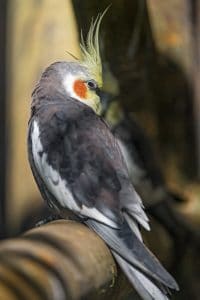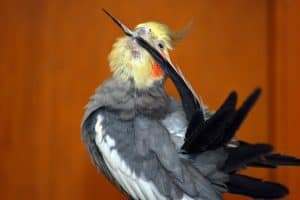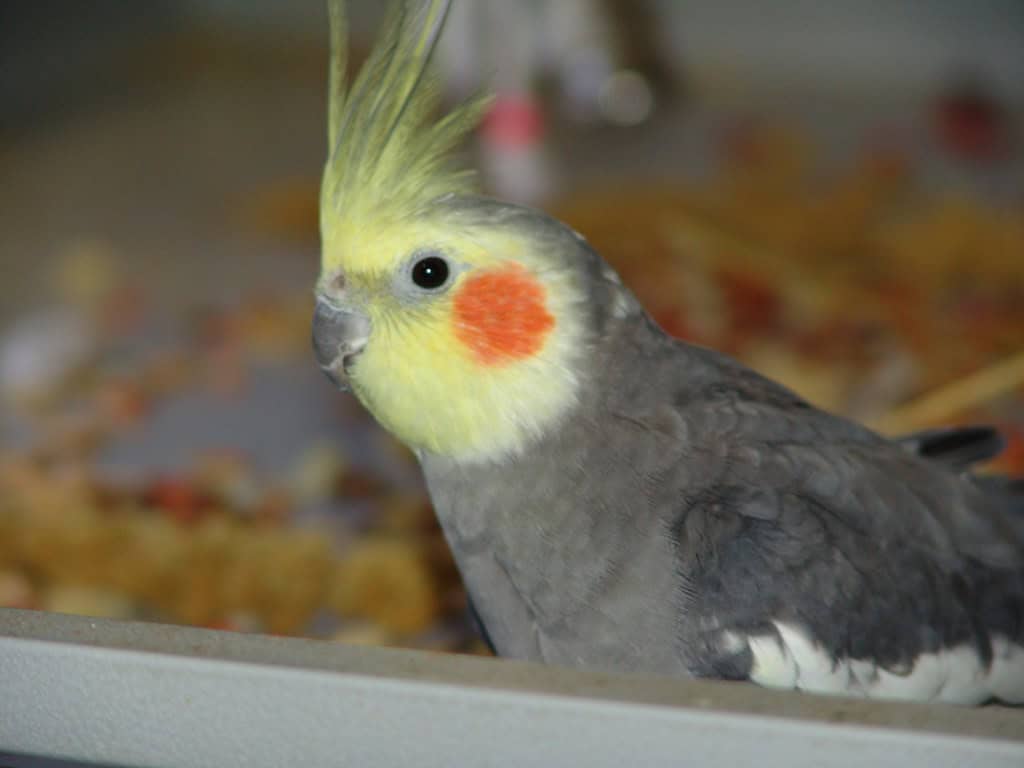Cockatiels are delightful companions, but like any pet, they can face health issues. Recognizing cockatiel health symptoms early can make all the difference in ensuring your feathered friend stays happy and healthy. From changes in behavior to physical signs, knowing what to look for can help you act quickly.
I’ve spent years caring for these charming birds, and I’ve learned that even subtle symptoms can indicate underlying problems. By understanding common cockatiel health symptoms, you can provide better care and seek veterinary help when needed. Let’s dive into the key signs to watch for in your cockatiel’s well-being.
Cockatiel Health Symptoms Overview
Recognizing health symptoms in cockatiels is crucial for their well-being. Monitoring changes in behavior or physical signs helps identify potential issues early.

Importance of Monitoring Health
Monitoring your pet bird’s health enables early detection of issues. Noticing signs of illness, such as changes in feathering or posture, helps pet bird owners take swift action. Avian veterinarians recommend regular checks as even subtle symptoms could indicate significant problems. A healthy bird has bright eyes, smooth feathers, and normal activities. Observing deviations can prevent more severe health complications.
Early Warning Signs
Early warning signs in cockatiels can be indicators of underlying health issues. Tail bobbing and labored breathing signify respiratory problems. Weight loss, decreased appetite, and undigested food in droppings suggest digestive problems. Feather loss and abnormal color changes could indicate feather diseases. Monitoring these signs and consulting an avian vet if observed helps in maintaining the bird’s health. Immediate veterinary care is essential if you notice open mouth breathing or signs of egg binding in female birds.
Common Health Issues in Cockatiels
Monitoring for health symptoms ensures your cockatiel’s well-being. Pet bird owners must recognize common diseases early to seek prompt treatment.
Respiratory Infections
Respiratory infections in cockatiels often present with clinical signs like tail bobbing, open mouth breathing, and labored breathing. Other symptoms include nasal discharge, sneezing, and difficulty breathing. These infections are commonly caused by bacteria, viruses, or poor sanitation. If a cockatiel exhibits these signs of illness, consulting an avian veterinarian immediately is crucial. The vet may conduct diagnostic tests, including blood tests and x-rays, to determine the cause and develop an appropriate treatment plan.
Digestive Problems
Digestive problems manifest through symptoms like weight loss, undigested food in droppings, and a decreased appetite. Other signs include changes in droppings’ color and consistency. These issues can stem from infections, poor diet, or internal parasites. If your bird’s illness includes these symptoms, a physical examination by a board-certified avian vet is necessary. Treatment may involve dietary adjustments, medications, and improved cage hygiene.

Feather and Skin Disorders
Feather and skin disorders in cockatiels include feather loss, abnormal feather color, and the presence of pin feathers. Feather diseases and fungal infections can cause these issues. Catching these signs early helps maintain a healthy bird. An avian vet might recommend specific treatments, like antifungal medications or changes in the bird’s diet. Ensuring your cockatiel has a separate room from other pets can prevent the spread of infections.
Parasites
Parasites, such as mites and lice, present symptoms like feather loss, itching, and skin irritation. Regular checks and clean environments can minimize these risks. An avian veterinarian can prescribe treatments like topical medications to eliminate these parasites. Monitoring your bird’s body carefully helps detect infestations early.
Behavioral Changes
Behavioral changes often signal underlying health problems. Signs like decreased activity, changes in vocalization, and reduced social interaction indicate that something’s wrong. Observing a sick bird might reveal it staying at the cage floor or avoiding normal activities. If these changes overlap with other symptoms, immediate veterinary care is essential. Avian veterinarians can diagnose the root cause and recommend a suitable treatment plan, ensuring your feathered friend’s full recovery.
Regular monitoring for these common health issues helps maintain your cockatiel’s health. Recognizing the first signs of illness and seeking timely veterinary medicine support ensures your bird’s well-being.
Identifying Symptoms
Recognizing health symptoms in cockatiels is essential for their well-being. Early detection of any behavioral or physical changes ensures timely intervention and veterinary care.
Physical Symptoms
Feather Condition: Observe the condition of the feathers. Feather loss or color changes could indicate a feather disease or nutritional deficiencies. Pin feathers appearing ragged may suggest a disease.
Eyes and Nostrils: Check the eyes and nostrils. A healthy bird has bright eyes and clear nostrils. Discharge, swelling, or an abnormal color indicates a possible infection.
Breathing Pattern: Monitor the breathing. Tail bobbing or labored breathing can signal respiratory issues. Heavy breathing and open mouth breathing are signs of distress.
Droppings: Examine the droppings. Normal droppings are firm. Abnormal color or consistency, undigested food, or a strong odor points to digestive problems or infections.
Body Weight: Track the body weight. Weight loss is a critical indicator of illness. A prominent keel bone often signifies malnutrition or chronic disease.
Behavioral Symptoms
Activity Levels: Watch the activity levels. Healthy cockatiels are active. Decreased activity or excessive sleepiness suggests illness.
Eating and Drinking Habits: Note changes in eating or drinking. A bird eating less or showing decreased appetite may be sick. Increased water intake can also indicate health issues.
Vocalization: Pay attention to vocalization. Changes in vocalization patterns or a decrease in usual sounds can be a symptom of underlying health problems.
Perching and Movement: Notice perching behavior. Reluctance to perch or clumsiness indicates potential joint or muscle issues.
Interaction with Owners and Other Pets: Observe interactions. A sick bird often becomes less social, avoiding interaction with owners or other pets.
By systematically checking these signs, pet bird owners can ensure prompt veterinary care, potentially preventing more severe health issues. Consulting an avian vet when these symptoms are present is crucial for maintaining a cockatiel’s health.
Prevention and Care
Preventing health issues in cockatiels revolves around proper care. A well-maintained environment, balanced diet, and regular check-ups with an avian veterinarian can ensure a healthy bird.
Diet and Nutrition
A balanced diet is crucial for a cockatiel’s health. Including seeds, pellets, fresh fruits, and vegetables ensures they receive proper nutrients. Avoiding foods like chocolate, caffeine, and avocado is essential as they can be toxic to pet birds. Close monitoring of the bird’s eating and drinking habits can prevent nutritional deficiencies and weight loss, which are early signs of illness.
Regular Veterinary Check-ups
Routine visits to an avian vet are vital for detecting potential health issues early. Early detection enables timely treatment, often preventing severe health complications. Regular check-ups involve physical examinations, blood tests, and x-rays. Consulting a board-certified avian veterinarian for any abnormal behavior ensures professional and accurate diagnosis and treatment planning for your feathered friend.
Proper Enclosure and Hygiene
Maintaining a clean and safe enclosure is essential for preventing diseases. Regular cleaning of the cage floor, perches, and food bowls can minimize the risk of infections and poor sanitation-related illnesses. Ensuring the cage is spacious enough allows the bird to move freely and exercise, which is critical for their overall health. Keeping the cage in a well-ventilated area but away from drafts helps maintain a comfortable temperature, preventing respiratory issues.
A well-rounded approach to prevention and care promotes a healthy life for cockatiels. Regular monitoring and proactive healthcare reduce the chances of severe illnesses, keeping your bird vibrant and happy.
When to Seek Veterinary Help
Recognizing when to seek veterinary help ensures a cockatiel’s health remains optimal. Immediate action is crucial when observing specific symptoms.
Emergency Symptoms
Certain signs of illness require urgent attention from an avian veterinarian. These symptoms include open mouth breathing, tail bobbing, and difficulty breathing. When a bird exhibits labored breathing or constant heavy breathing, it’s imperative to contact a vet immediately. Egg binding in females is another emergency, characterized by a swollen abdomen and apparent distress.
Other critical signs involve sudden weight loss, severe feather loss, and undigested food in droppings. These issues often indicate severe digestive problems or systemic infections. A bird that drinks water excessively or shows signs of dehydration requires prompt veterinary care. Additionally, if a bird’s eye appears swollen or it shows signs of clinical illness, such as lethargy or decreased appetite, immediate consultation is necessary.
Regular Consultation Guidelines
Routine check-ups with a board-certified avian vet are essential for maintaining a healthy bird. Annual examinations help identify potential issues before they escalate. Regular blood tests and x-rays can detect underlying conditions that physical examination might miss.
Bird owners should schedule visits to monitor nutritional intake and weight. Observing the bird’s body condition, including the keel prominence and feather quality, is vital. During these visits, vets check for signs of feather disease, fungal infections, and other ailments.
Avian veterinarians provide guidance on preventive care, including ideal cage conditions and dietary requirements. Ensuring a clean cage floor and managing perching behavior help prevent common diseases. Regularly consulting an avian vet, combined with vigilant observation for emergency symptoms, guarantees a feathered friend’s well-being.
Recognizing health symptoms in cockatiels is crucial for their well-being. By staying vigilant and monitoring both physical and behavioral changes, I can ensure my feathered friend stays healthy and happy. Early detection of issues like respiratory problems or digestive disturbances can make a significant difference.
Regular check-ups with an avian vet and maintaining a clean, spacious environment are essential steps in preventing diseases. A balanced diet and close observation of eating habits help avoid nutritional deficiencies. When symptoms like open mouth breathing or tail bobbing appear, immediate veterinary care is vital.
By adopting these practices, I can provide the best care for my cockatiel, ensuring a long, vibrant life filled with joy and companionship.
Frequently Asked Questions
What are common signs of illness in cockatiels?
Common signs of illness in cockatiels include changes in feathering or posture, labored breathing or tail bobbing, weight loss, abnormal droppings, and changes in vocalization. If you notice these symptoms, it’s crucial to consult an avian veterinarian promptly.
How can I prevent health issues in my cockatiel?
To prevent health issues, maintain a balanced diet, provide a clean and spacious enclosure, avoid toxic foods, and schedule regular check-ups with an avian veterinarian. Monitoring their eating habits, feather condition, and overall behavior can help detect problems early.
When should I take my cockatiel to the vet?
You should take your cockatiel to the vet if you observe symptoms such as open mouth breathing, tail bobbing, labored breathing, significant weight loss, abnormal droppings, or signs of egg binding in females. Regular veterinary check-ups are also recommended for ongoing health monitoring.
What behaviors indicate a cockatiel might be sick?
Behaviors indicating a sick cockatiel include decreased activity, changes in eating and drinking habits, altered vocalization, inactivity or reluctance to perch, and withdrawal from social interactions. Noticing these changes early can help in seeking timely veterinary care.
How often should I check my cockatiel’s health?
Regularly checking your cockatiel’s health is essential. Perform a basic health check weekly, observing their feather condition, eye clarity, nostril cleanliness, breathing patterns, droppings, and body weight. Schedule thorough check-ups with an avian veterinarian every 6-12 months.
What should I do if my cockatiel shows signs of respiratory issues?
If your cockatiel shows signs of respiratory issues, such as open mouth breathing or tail bobbing, consult an avian veterinarian immediately. Respiratory problems can be serious and require prompt medical attention to prevent further complications.
How important is a balanced diet for cockatiels?
A balanced diet is crucial for cockatiels to avoid nutritional deficiencies and maintain overall health. Ensure they receive a variety of foods, including seeds, pellets, fresh fruits, and vegetables. Regularly monitor their eating habits and consult a vet for dietary advice.
What are the early warning signs of digestive problems in cockatiels?
Early warning signs of digestive problems in cockatiels include weight loss, abnormal droppings in color or consistency, decreased appetite, and signs of discomfort or lethargy. If these symptoms are noticed, seek veterinary advice to address potential digestive issues.
Key Takeaways: Cockatiel Health Symptoms to Watch
- Daily scan checklist
– Feathers: smooth, intact; ragged or plucked = stress/illness
– Eyes/nostrils: clear, no discharge
– Breathing: quiet; tail bobbing or open-mouth = respiratory emergency
– Droppings: firm, uniform color; undigested food, diarrhea, or odor change = GI issue
– Weight: weekly weigh-ins; ±5–10 % drop or gain = vet visit - Red-flag behaviors
– Sudden lethargy, loss of appetite, or silence from a normally vocal bird
– Reluctance to perch or repeated falling to cage floor
– Excessive sneezing, wheezing, or constant fluffing of feathers - Common problems & triggers
– Respiratory infections: dusty seed, poor ventilation, second-hand smoke
– Digestive upset: spoiled food, fatty seed-only diet, parasites
– Feather/skin issues: mites, lice, malnutrition, boredom/stress plucking
– Egg-binding (females): swollen abdomen, straining, no droppings - Prevention plan
– Balanced diet: 70 % pellets + 30 % fresh veg/fruit; avoid avocado, chocolate, caffeine
– Clean cage daily, full scrub weekly; use paper liners, no scented cleaners
– Vet check-ups every 6–12 months; immediate appointment for any red-flag sign - Emergency vet call: open-mouth breathing, seizures, severe bleeding, or inability to pass droppings.



